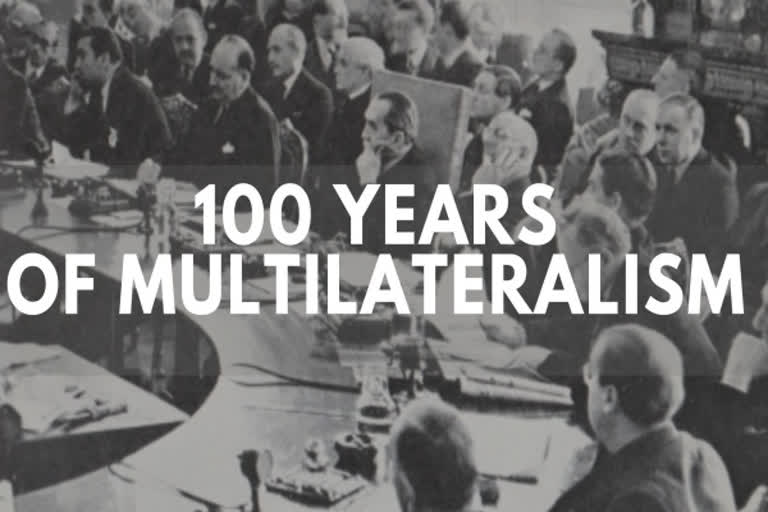Hyderabad: January 10 marks 100 years of modern multilateralism, as the League of Nations began to function on this day a century ago. Of course, the League failed to prevent the outbreak of World War II, but its short-lived existence provided the ground for many of the current activities of specialized agencies of the United Nations (UN).
The founding principle of the League was the "principle of international cooperation", which continues to drive its successor organization - the United Nations - till today. In April 1946, the League members met in Geneva and decided to transfer its properties and heritage to the UN.
As a signatory to the June 1919 Treaty of Versailles (commemorated by an Indian postage stamp issued in August 2019 by India Post), India automatically became an original "founding" member of the League.
As the only non-self-governing "nation" represented in the League, India's membership has been termed "the anomaly of anomalies" by legal historians, who have, however, conceded that as a founder-member of the League, India enjoyed equal legal status with the other sovereign members of the League.
Two areas of India's first foray into multilateralism through the League stand out in modern India's foreign policy today.
First, her commitment to peace and the prevention of war. India was one of the 15 members of the League that signed the Kellogg-Briand Pact (also known as “The Peace Pact”) in Paris in 1927, which outlawed war. U.S. Secretary of State Kellogg was awarded the Nobel Peace Prize in 1929 for his role in initiating the Treaty.
Second, her involvement in the newly created multilateral structures to sustain domestic socio-economic development. India's active membership of the International Labour Organization (ILO), also created by the Treaty of Versailles, since 1922 has been amply recognized by India's Ministry of Labour.
Since 1922, India has been one of the 10 permanent members (as a “country of chief industrial importance” among the 28 governments represented in the ILO’s governing council. Among the issues of direct interest to India which were raised at the ILO were the relaxation of working hours for industrial workers due to India’s specific climate conditions and special treatment for Indian seamen.
Interestingly, India was also the only member of the League to have signed and ratified the French-initiated Convention for the Prevention and Punishment of Terrorism (1937), which was not signed by Britain. The Convention focused on the legal obligation of "prosecute or extradite". This principle is carried forward into India's current efforts to have the UN adopt a Comprehensive Convention on International Terrorism (CCIT).
Of the Indian envoys who left a legacy in multilateral diplomacy from the first decade of the League of Nations, the name of India's fourth High Commissioner in London, Sir Atul Chatterjee, ICS stands out. The topper of the 1896 batch of the Indian Civil Service, he succeeded in constructing India House in Aldwych in London, the building that houses India's oldest diplomatic representation abroad till today. As the leader of India's delegation to the League and the ILO, he played a prominent role, becoming the first Indian to preside over both the General Assembly (1927) and Governing Body of the ILO (1933).
At its First Assembly on December 18, 1920, the League decided to create an International Committee for Intellectual Cooperation. France volunteered to finance and house the Committee, which was the precursor of the United Nations Educational, Cultural and Scientific Organization (UNESCO), headquartered in Paris.
India's role in augmenting intellectual cooperation for peace and the "unity of mankind" was actively propagated by Dr Sarvepalli Radhakrishnan, who was a member of the Committee from 1931-1938. Dr Radhakrishnan represented India in UNESCO between 1946-1952. He became Vice President of the Republic of India (1952-1962), and President of the Republic of India (1962-1967).
Also read: SP MP Azam Khan and family declared absconders
As a stakeholder in multilateral diplomacy for a century, India is well-placed today to build on her experience to focus on international cooperation for world peace and socio-economic development. India’s impending election to a non-permanent seat in the UN Security Council for the 2021-2022 term, and her expected chairmanship of the G-20 in 2022, will provide important platforms to achieve this objective.




